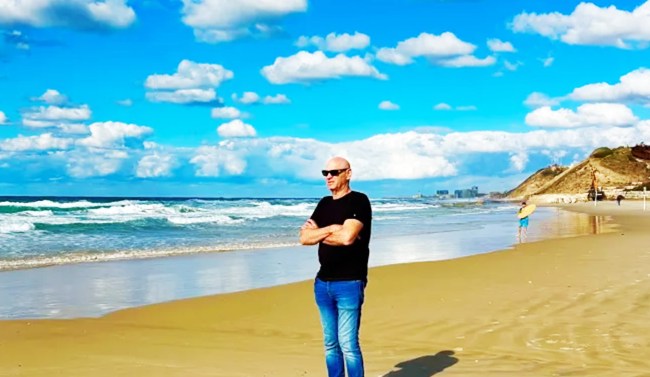The Toronto International Film Festival announced this week that Barry Avrich’s documentary The Road Between Us: The Ultimate Rescue, about Hamas’ Oct. 7, 2023 attacks in Israel, has been pulled from the lineup. According to organizers, the decision boiled down to an issue over footage rights issue and security concerns. But the filmmaking team calls the move censorship. Here’s a brief look at what’s going on.
WHAT IS THE FILM ABOUT?
The Road Between Us: The Ultimate Rescue is a documentary by the Canadian filmmaker and follows retired Israeli Gen. Noam Tibon as he attempts to rescue his son, journalist Amir Tibon, and his family during the Oct. 7, 2023 Hamas‑led attack on Kibbutz Nahal Oz in southern Israel. The film includes footage captured by Hamas militants during the attack, in which over a quarter of the kibbutz’s roughly 400 residents were killed or taken hostage.
THE FESTIVAL POSITION
TIFF had invited the documentary to be part of its 2025 lineup but later withdrew the invitation, according to Deadline, who first reported the story.
In a statement, a representative for TIFF said, “The invitation for the Canadian documentary film The Road Between Us: The Ultimate Rescue was withdrawn by TIFF because general requirements for inclusion in the festival, and conditions that were requested when the film was initially invited, were not met, including legal clearance of all footage. The purpose of the requested conditions was to protect TIFF from legal implications and to allow TIFF to manage and mitigate anticipated and known risks around the screening of a film about highly sensitive subject matter, including potential threat of significant disruption.”
Filmmakers were previously instructed to make editorial changes that specifically identified the source of graphic footage livestreamed by Hamas on Oct. 7, 2023 — footage that had already been publicly circulated. However, the festival maintains that it did not ask for editorial changes, but rather requested confirmation of the footage’s source and proof of legal clearance.
THE FILMMAKERS’ RESPONSE
The filmmakers called the move “censorship.” In a statement, they said: “We are shocked and saddened that a venerable film festival has defied its mission and censored its own programming by refusing this film. Ultimately, film is an art form that stimulates debate from every perspective that can both entertain us and make us uncomfortable. A film festival lays out the feast and the audience decides what they will or won’t see. We are not political filmmakers, nor are we activists; we are storytellers. We remain defiant, we will release the film, and we invite audiences, broadcasters, and streamers to make up their own mind, once they have seen it.”
Israeli Foreign Minister Gideon Sa’ar condemned TIFFs decision, stating: “This festival would have asked Hitler or Goebbels for copyright on Auschwitz footage. … This vicious and sickening decision must be cancelled immediately!” While Noah Shack, CEO of the Centre for Israel and Jewish Affairs (CIJA), added: “This shameful decision sends an unmistakable message: Toronto’s Jewish community, which has long played an integral role at TIFF, is no longer safe or welcome. This should concern all Canadians and marks a stain on the festival’s reputation. TIFF must reverse this decision immediately.” The filmmakers emphasized that the footage was publicly available and argued that requiring permission from a terrorist organization was unreasonable.
THE FESTIVAL REBUTTAL
Toronto International Film Festival CEO Cameron Bailey has pushed back against the censorship narrative. In a statement to Variety on Wednesday, Bailey apologized for “any pain this situation may have caused,” and said that “this situation calls for compassion and sensitivity, and I recognize the concerns it has raised among members of the Jewish community and beyond. ”
“My intention was to screen The Road Between Us: The Ultimate Rescue, which is why I extended the invitation for the film to participate in this year’s festival. Given the sensitive and significant nature of the film’s subject, I believe that it tells an important story and contributes to the rich tapestry of perspectives in our lineup – stories that resonate both here at home and around the world.
“I want to be clear: claims that the film was rejected due to censorship are unequivocally false. I remain committed to working with the filmmaker to meet TIFF’s screening requirements to allow the film to be screened at this year’s festival. I have asked our legal team to work with the filmmaker on considering all options available.”
Bailey concluded by asking for “patience and understanding as we navigate this complex landscape.”
“The events of Oct. 7, 2023 and the ongoing suffering in Gaza weigh heavily on us, underscoring the urgent need for compassion amid rising antisemitism and Islamophobia,” he said. “While we are not a political organization, TIFF will always strive to present our programming in a safe, inclusive environment.”
WHAT’S NEXT?
Despite the setback, the filmmakers announced their intention to release the film independently so that audiences worldwide can see it.
THE BIG PICTURE
The controversy underscores the challenges festivals, distributors, and awards organizations are facing in a politically fraught climate. For example, this year’s Oscar-winning documentary feature No Other Land, chronicling the alliance between a Palestinian activist and an Israeli journalist, has yet to find a U.S. distributor despite its acclaim. As one of the No Other Land’s codirectors put it, “There is much less space for this kind of criticism, even when it comes in the form of a film.”



